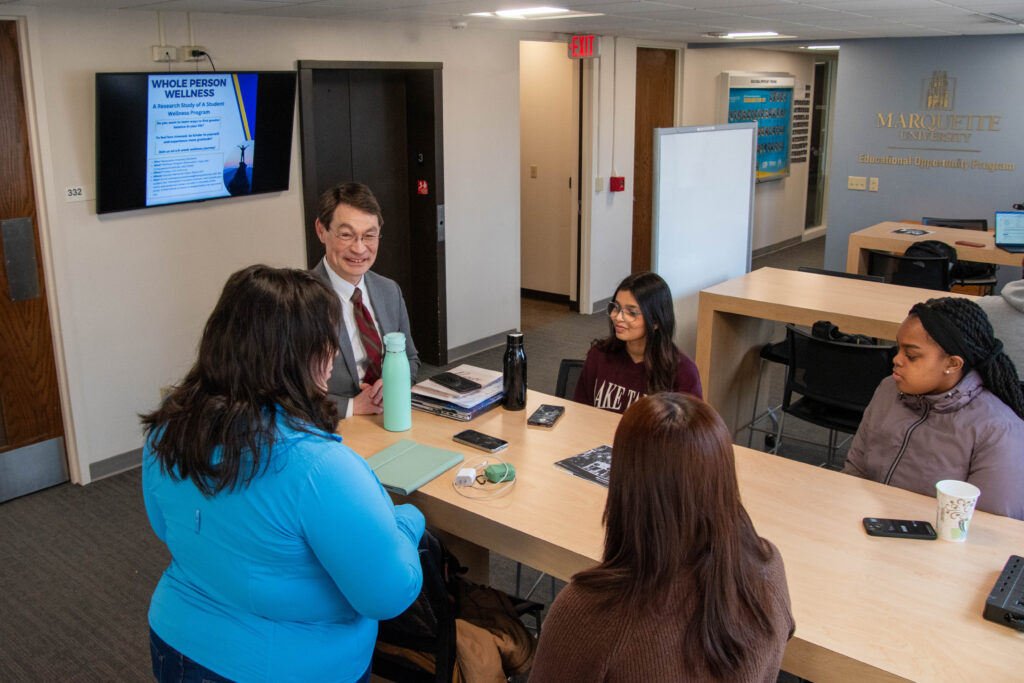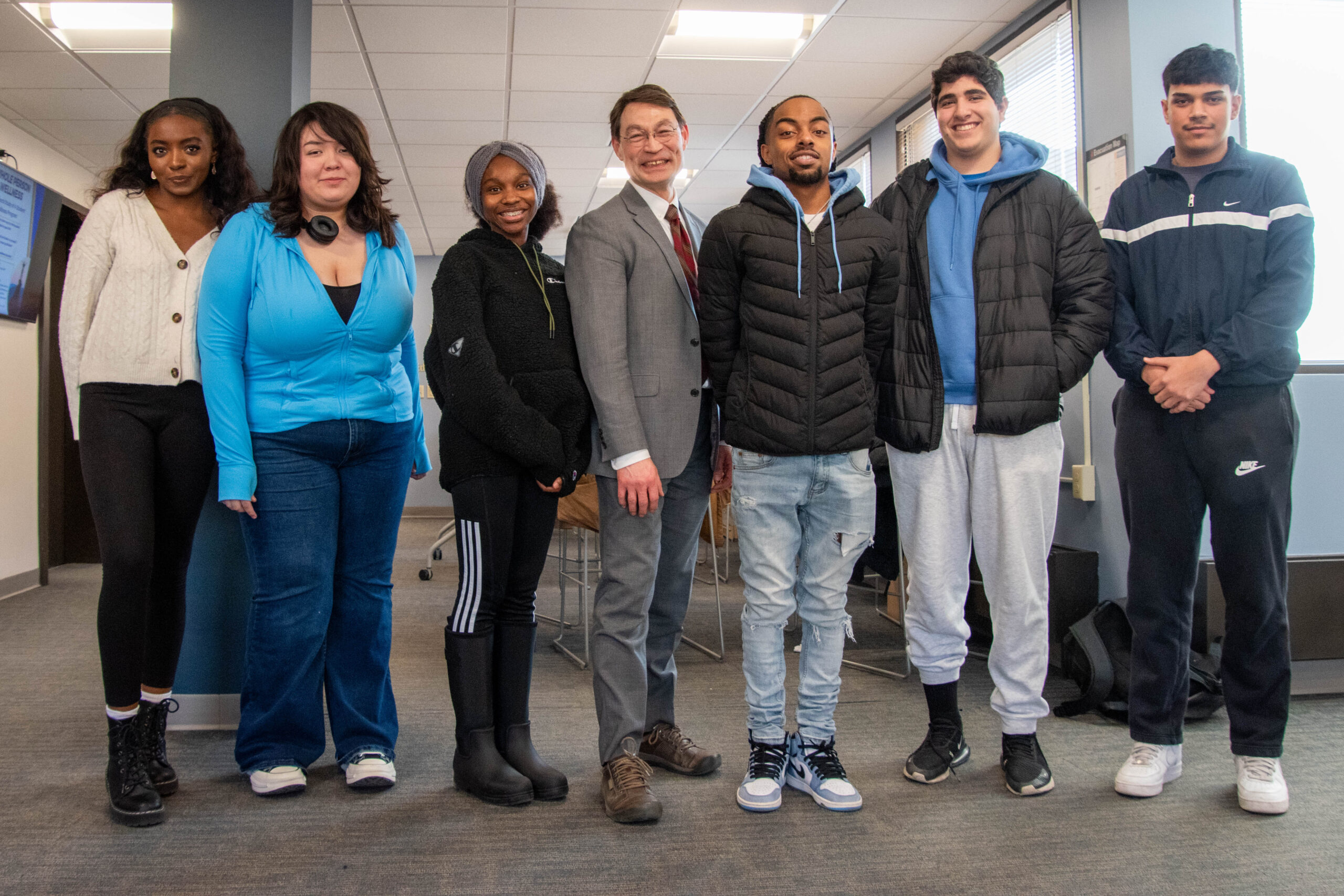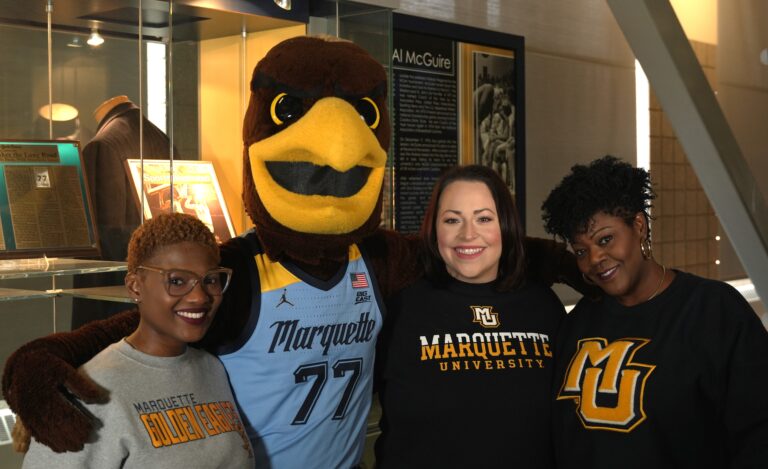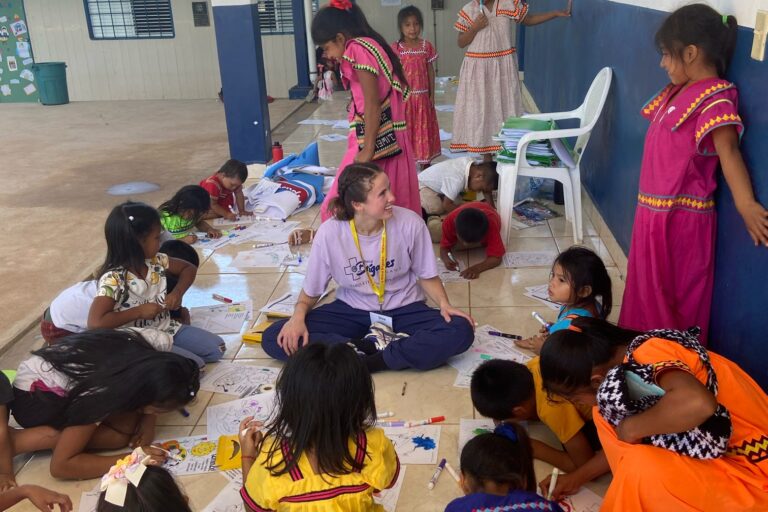Undergraduate biochemistry student John Su stepped dejectedly out of class on a gray Midwestern day in the 1980s. He’d just done something for the first time: fail a lab assignment.
As he trudged down the hallway, Su watched his classmates walk away in groups toward their dorms and dining halls, laughing and commiserating. Su, a commuter student, walked alone toward the vacant bus stop. He sat on a bench under a streetlight and quietly began to cry.
Today, Su is Marquette’s vice provost for academic affairs and student success, with more than two decades of experience as a literature professor. He recalls, “I didn’t think my parents would be able to understand, and I had nobody to reach out to. I remember hoping someone would notice me and ask if I was alright, but nobody did.”
That experience shaped Su’s career and outlook on the purpose of higher education. Leading Marquette’s Student Success Initiative since 2021, Su ensures that every student has someone to rely on for guidance outside the classroom. Caring for the whole person is a core part of Marquette’s mission, and Su’s job entails building an environment that reflects it.
“Every student should have a person on campus they can go to with problems who will say, ‘It’s going to be OK. We’ll figure this out,’” Su says.
Key belonging indicators
Anyone who works in student success knows there’s no singular definition of the term.
Su can describe the necessary components for an effective student success strategy and list the metrics universities use to gauge student achievement and outcomes. He can recite Marquette’s goals —retain 94 percent of students between years one and two, achieve a six-year graduation rate of 90 percent, and have at least 94 percent of graduates be either employed, in the military, in graduate school or doing service work within six months of walking across the stage.
What counts as success, though, depends on the student.
Su explains that there are two critical questions that indicate if a student success program is working:
- Students know who to call for any question they have.
- Students are doing something outside of class at least once per week that they enjoy.
The degree to which students agree with these two statements signals their level of belonging within the Marquette community, which Su views as essential for having a meaningful college experience.
“So much of college is about navigating changing relationships,” Su says. “College draws students away from their parents, their teachers, their friends –– the relationships they’ve had for most of their lives. It’s an opportunity to build new relationships, yes, but we as a university need to be proactive about making that happen.”
Far from being a monolith, student success is instead a layered patchwork of services, all leading to the same goal: holistic well-being.
Formation of hearts and minds
While academic support, such as tutoring services and study groups, is a core aspect of the Student Success Initiative, formation is equally important as a cornerstone of Marquette’s Catholic, Jesuit identity.
“Formation is about you as a whole person, not just classes and grades,” Su explains. “If you have a compelling reason to stay on campus and stay engaged, that’s what leads to great outcomes from a student success perspective.”
Su and his colleagues know that a meaningful college experience pushes students to better understand themselves and their motivations, interests and strengths. Students who develop a stronger sense of self as they learn more about the world are better positioned to achieve their goals during and after college.
For similar reasons, student success is for those who are struggling and high achievers alike.
Equal emphasis on formation is important to avoid blind spots that come with equating academic performance with student well-being. For example, there is a common misconception that the student with a 2.5 GPA needs extra help and a student with a 4.0 does not. The student with a 2.5 GPA might be a 4.0 in another major and benefit from advising services instead of tutoring. The 4.0 student might be on the dean’s list, but also spend every weekend alone in a dorm room, which necessitates a different kind of support.
Far from being a monolith, student success is instead a layered patchwork of services, all leading to the same goal: holistic well-being.
“It’s easy to fall into a mindset of addressing deficit when supporting students. Instead, our approach is to start with the strengths our students possess and explore how we can assist them in their journeys to realizing their fullest potential as persons with and for others,” Su says.

A place for guidance and exploration
Marquette will open the Lemonis Center for Student Success in 2024 to help facilitate many services within the student success initiative. The building will include student success navigators to guide first-year students, an academic engagement network for professional instructors and peer mentors to pair students within similar academic programs, among other assets to serve Marquette’s student population.
“We have an amazing network of support across campus right now doing incredible work, but the students are the ones who often have to navigate it,” Su says. “Now we’re shifting to bringing all these services together and delivering it to students. This is a chance for me and everyone else who works in student success to be even more connected.”
Kickstarted by a $15 million gift from alumnus Marcus Lemonis and his wife, Bobbi, the Lemonis Center will be an inviting place for students to not only get support for their needs but also explore their curiosities. Center staff will prioritize forming durable relationships with learners, ensuring they are never alone when dealing with the myriad changes that happen over the course of college.
While construction continues, Su remains hard at work with the many faculty and staff focused on classroom, communication and community aspects within the strategy.
He also makes a point to connect with students directly to hear about their experiences and get feedback. As part of his regular “Chat and Chew with Dr. Su” lunch sessions, he visits with Educational Opportunity Program students to listen to their ideas for navigating college — a conversation he wishes he could have had as a student many years ago.



